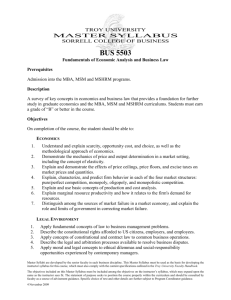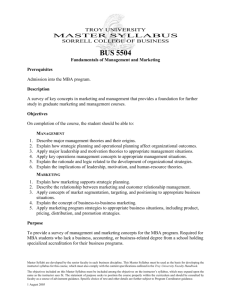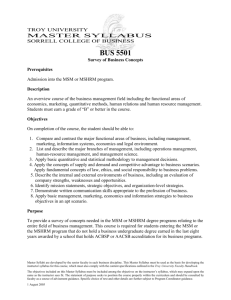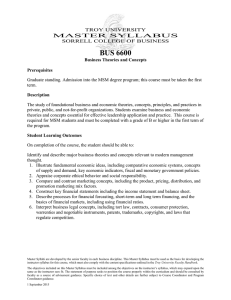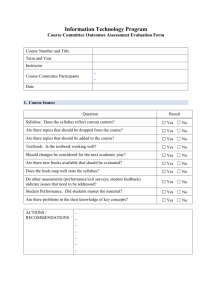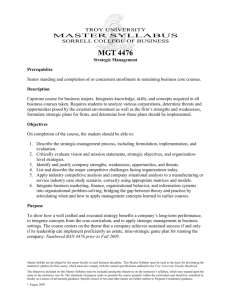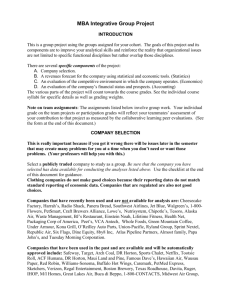BUS 5505 - the Sorrell College of Business at Troy University
advertisement
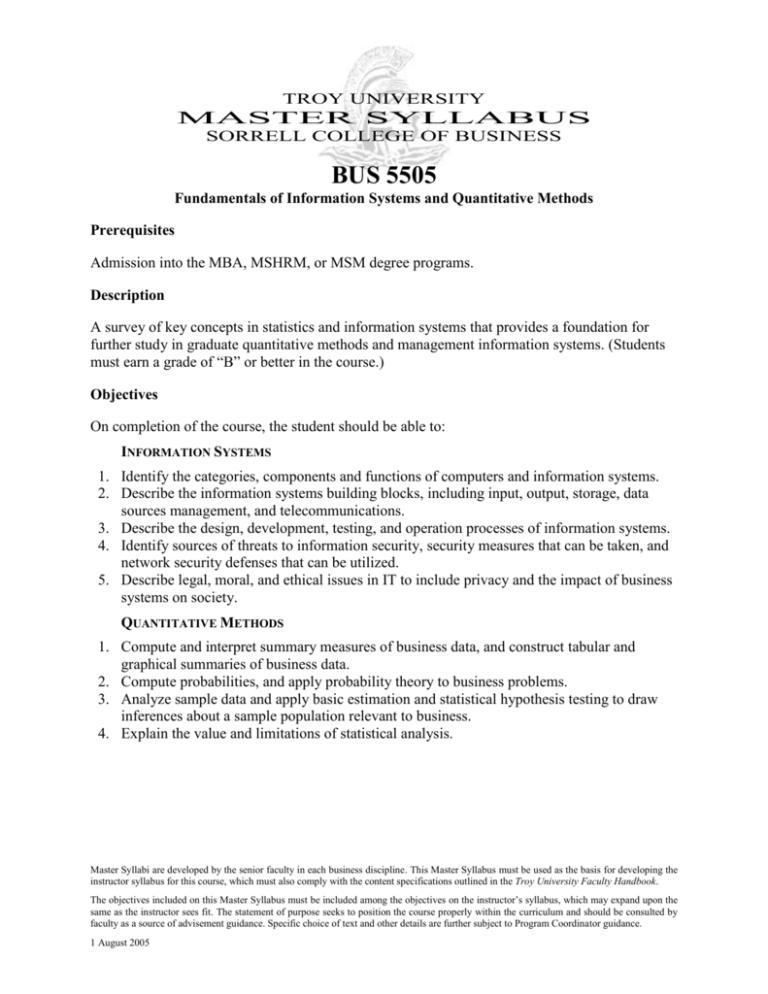
TROY UNIVERSITY MASTER SYLLABUS SORRELL COLLEGE OF BUSINESS BUS 5505 Fundamentals of Information Systems and Quantitative Methods Prerequisites Admission into the MBA, MSHRM, or MSM degree programs. Description A survey of key concepts in statistics and information systems that provides a foundation for further study in graduate quantitative methods and management information systems. (Students must earn a grade of “B” or better in the course.) Objectives On completion of the course, the student should be able to: INFORMATION SYSTEMS 1. Identify the categories, components and functions of computers and information systems. 2. Describe the information systems building blocks, including input, output, storage, data sources management, and telecommunications. 3. Describe the design, development, testing, and operation processes of information systems. 4. Identify sources of threats to information security, security measures that can be taken, and network security defenses that can be utilized. 5. Describe legal, moral, and ethical issues in IT to include privacy and the impact of business systems on society. QUANTITATIVE METHODS 1. Compute and interpret summary measures of business data, and construct tabular and graphical summaries of business data. 2. Compute probabilities, and apply probability theory to business problems. 3. Analyze sample data and apply basic estimation and statistical hypothesis testing to draw inferences about a sample population relevant to business. 4. Explain the value and limitations of statistical analysis. Master Syllabi are developed by the senior faculty in each business discipline. This Master Syllabus must be used as the basis for developing the instructor syllabus for this course, which must also comply with the content specifications outlined in the Troy University Faculty Handbook. The objectives included on this Master Syllabus must be included among the objectives on the instructor’s syllabus, which may expand upon the same as the instructor sees fit. The statement of purpose seeks to position the course properly within the curriculum and should be consulted by faculty as a source of advisement guidance. Specific choice of text and other details are further subject to Program Coordinator guidance. 1 August 2005 Master Syllabus: MBA 5505 2 Purpose To provide a survey of information systems and quantitative-methods concepts for the MBA, MSHRM, and MSM programs. Required for MBA, MSHRM, or MSM students who have not earned a business, accounting, or business-related degree from a school holding ACBSP or AACSB specialized accreditation for their business program (within eight years of the student enrolling in the MBA, MSHRM, or MSM program). Approved Texts Customized textbook, as available; otherwise, choose a text in each topical area, as follows: INFORMATION SYSTEMS: Laudon, K. C., & Laudon, J. P. (2009 or current). Essentials of Management Information Systems, (8th ed). Upper Saddle River, NJ: Prentice Hall. Rainer, R, Turban, E., (2008 or current), Introduction to Information Systems. Supporting and Transforming Business, (2nd ed). Wiley, QUANTITATIVE METHODS: Levine, D. M., Krehbiel, T. C., & Berenson, M. L. (2006 or current). Business statistics: First Course (4th ed.). Upper Saddle River, NJ: Prentice Hall. Anderson, D.R., Sweeney, D.J., & Williams,T.A. (2009 or current), Essentials of Statistics for Business and Economics, (5th ed.) Thomson-Southwestern. Supplements As deemed appropriate. ------------------------------------------------------------------------------(UPDATED by IS-DCC and QM-DCC: December 2, 2009) Added and updated books, purpose, objectives, prerequisite, and description statements. Troy University Faculty Handbook (2008): Section 3.9.2.8 (Latest Handbook) [extract]—24 essential elements of the syllabus (modified to match available space): a. b. c. d. e. f. g. Course title Course number Term Instructor Prerequisites Office hours Class days, times h. i. j. k. Classroom location n. Grading methods, Office location criterion weights, Office telephone make-up policy, Course description, mid-term grade objectives reports l. Text(s) o. Procedure, course m. Other materials requirements p. General supports (computer works, writing center) q. Daily assignments, holidays, add/drop & open dates, dead day, final exam r. ADA Statement w. Academic s. Cell phone and misconduct, electronic device plagiarism policy statement x. Specialization t. Additional services requirements u. Absence policy (certification, v. Incomplete-work licensure, teacher policy competencies)
